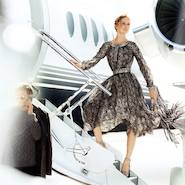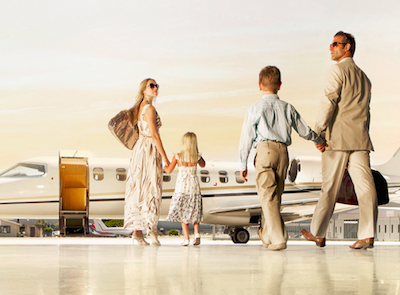At the highest end of the travel market, the normal rules no longer apply.
Nota Bene gives its ultra-high-net-worth clients – its database contains around 6,000 names – the opportunities for experiences and the reservations that other luxury travelers, no matter how frequent, could never buy. But managing a group of consumers with high expectations requires constant work to ensure the service is up to the equally high standards.
“[The Nota Bene client is] the kind of person who will say, ‘I want to do something extraordinary, suggest it to me’; the kind of person who might want to have state with an Earl in England; the kind of person who wants to drink Champagne with the Louis Roederer family,” said Anthony Lassman, co-founder of Nota Bene.
“It’s about saying, ‘I think you would like 12A because it has two balconies and you’re going there when the weather is warm and you have a lovely sky at night facing uptown,’ or ‘You’d prefer 16C, which is done by Michael White so it has more wood floors and is more European in style,'” he said. “It’s that kind of detailing.
“We like the kinds of people who say, ‘We leave it to you; we want the best, we want the most wonderful experience.’ We give it to them and are available to them throughout the trip.”
In this Q&A, Mr. Lassman discusses the particularities that set Nota Bene part, plans for the future and changes the highest end of the travel industry.
Everything that’s written about Nota Bene says it isn’t something you heard from somebody who heard from somebody. How do you have ears in so many different cities?
By having a really well trained team who is allowed, encouraged to travel to see so they can speak with first hand knowledge.
You cannot have as we have, a fee paying private clientele of UHNW individuals and put yourself out as being an expert if you haven’t actually seen and experienced it yourself. I would say, give us a place, throw a place at us and see the kind of detail we will come up with. Then you can judge.
We cannot be 100 percent up-to-date on everything in the whole word – that is an impossibility, but I’d say percentage wise for the amount of traveling we do and the detailing we do and the length of time we spend to do this, we are pretty well off.
What are some of those future plans?
We will go back to print publishing. When everyone said, ‘Oh books will be the things of a past and the whole world is going online,’ I listened.
I think they were wrong, I really do. You are seeing, and there is some data saying there’s definitely a resurgence and reversion to print publishing. We used to print these beautiful books people loved, and people will say to me there is nothing like them. It was really that kind of voyage, the photos were taken by one of the team, they weren’t brought in and we didn’t get professional photographers to stage something. It was actually like you were on that journey and this is what you found. So publishing is one of the areas we will go into.
My wife [Nota Bene co-founder Elena Lassman] has knowledge on fashion and lifestyle, and that’s something we will delve into more. People want to know, ‘How should I dress? What should I take? What luggage?’ All those kinds of things. But at the moment we still have a lot of work we are doing on the core product.
How will you differentiate online and offline?
The online has to keep developing because people want quick information. The idea of having a mobile [phone], ‘I’m in New York, I’m a Nota Bene client, I want to know the top three restaurants on the upper east side.’ That’s quick, and being able to go right to that information – that’s a great tool to have.
But on the other hand, when you come back from your day out, you might want to pick up that Nota Bene book and read everything they say about the city and plan my next day. Or you might even have another book and be planning your next trip.
I think what I’m doing at the moment is looking at how we should go back to print publishing and whether we should do individual destination reviews as we once did or whether we should do a collection of cities. We’re just figuring that out, but it’s definitely on the agenda.

Affluent couple; image courtesy Michael Kors
How do you locate and maintain relations with your clients?
Over the years we built up a relatively modest-sizes database, about 6,000 names, many of whom I recognize. So they are pretty big people, captains in industry, heads of luxury brands, financiers, hedge-fund megastars, etc. It’s absolutely fascinating how people one year will ignore you completely, they won’t respond to anything. Sometimes that can be two years.
We just had an American lady, who traveled with us about three years ago, spent a lot of money – chartered a boat, stayed in a top suite – then went completely quiet when it came to renewal. So we thought, ‘What went wrong?’ Her testimonial was really positive, she wrote about how great it was, and she could never have gone to the places she did had it not been for Nota Bene, but then went completely quiet.
She’s just come back. People sometimes have family situations or are just not traveling. We have quite a powerful database of people who keep coming back, they’re either renewing or come back after a few years.
To grow further, we do more online marketing, we have partnerships that we are working with – private banks, private airline companies, etc. – and they bring people.
When someone goes dormant like that, how do you ensure they return?
We still communicate quite regularly, we do regular newsletters. Something that is interesting is that when we are in certain places, you will see the spike. For example, Paris, we were in Paris a few weeks back, and people love Paris, they say, ‘I want to know the latest in Paris,’ and people will sign on again.
Something triggers in their mind, and then they think, ‘We should probably go to Paris this year, Nota Bene are the people who can make it work for us, so we will become a client again.’
How has the UHNW travel space changed since you started the business?
I think it breaks down to two groups: One group will do more or less the same thing they have done for years…the things rich people have done historically for many many years.
The other kind that I think has definitely become the newer kind of client is the client who wants the experiential travel, for whom travel is the new status. It’s far less about the car you drive or the luggage you’re carrying – these people wouldn’t dream of showing up with a fleet of Louis Vuitton suitcases. They are the kinds of people for whom a South African safari might be too tame, too sanitized and want to do something pushing the boundaries.
For this group, time is precious. We have one lady who is from Dallas who does the most extraordinary trips but can only be there for 2 days. She flew from Cape Town to Antarctica, a five hour flight, because the money is there to do it and travel at the greatest comfort and says, ‘I want to do it but I don’t have anymore time, my work won’t allow it.’
Transport is key. If you have the money to avail yourself of the finest means of transport you can stretch one day into three. You need a lot of money to do it, but you can stretch that day. I think that’s where we come in, knowing the proximity of one place to the other and how you can get there and break the day up for different experiences.
Do sustainability and volunteering as you travel and philanthropy reach to your clients?
It’s obviously there and I am delighted that it is, but I can’t say I’m seeing it in a big way. There is some form of trend, and I do think that people are more philanthropically conscious. Obviously when you have been there and see how great luxury lives side-by-side with the most unbelievable poverty, it really gets at you, and people feel compelled to do things.
It’s something we would love to develop more and help to sustain. It’s on our development board, and we are trying to figure out how to do it and make sure we don’t just do it or seem to be doing it for monetary gain.

Image courtesy of Peninsula Hotels
Any other trends?
The wealthier they are, the more they expect everything is just going to be available to them whenever they want it. So consequently we need to develop relationships with top restauranteurs and hotels, people who charter boats and planes to be able to do these things.
It’s one thing to know places, it’s another to know people, and you need to know people. If someone wants to get a reservation somewhere you need to be able to make that happen.
People are doing things more last minute, spending a lot more money on shorter stays. It’s this ‘I don’t have the time, I want to go.’
from Travel and hospitality – Luxury Daily https://www.luxurydaily.com/nota-bene-offers-clients-experiences-money-cannot-buy/
via Your #1 Source to Finding Luxury & Designer Goods, Handbags & Clothes at or Below Wholesale: Click Here.



No comments:
Post a Comment